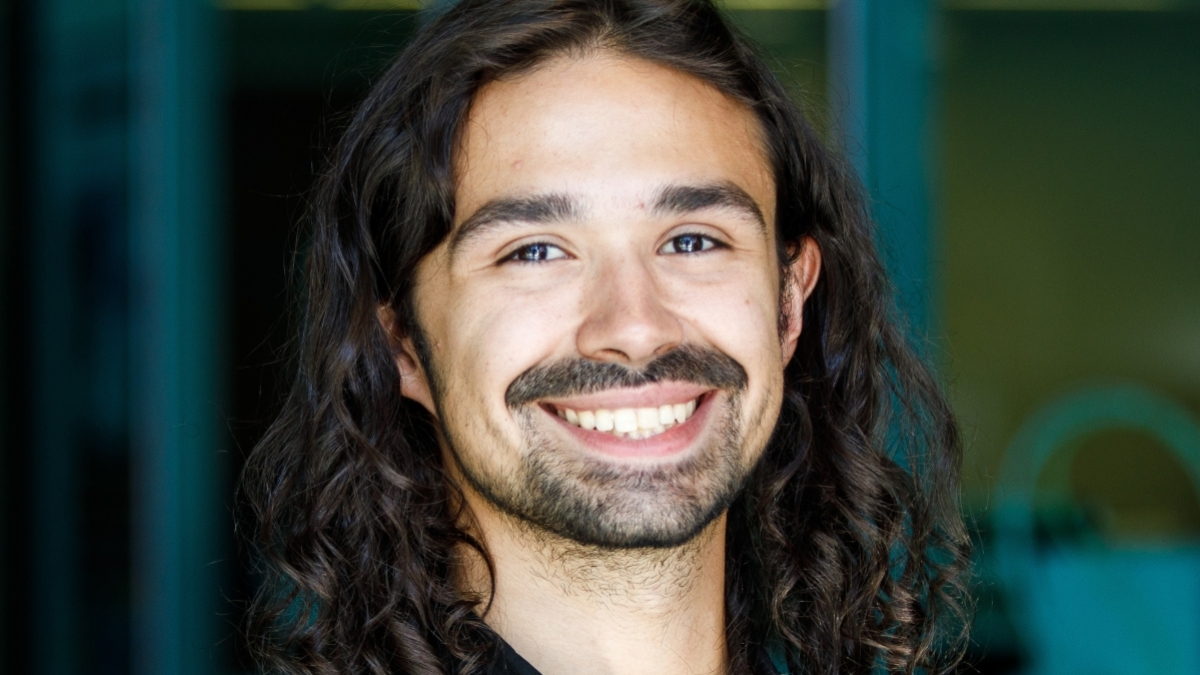ASU grad shoots for the stars with technological leadership degree

Matthew Marquez. Courtesy photo
Editor’s note: This story is part of a series of profiles of notable spring 2024 graduates.
Students eager to solve tomorrow’s most challenging problems are finding opportunities for growth, community, and scholarly success in ASU’s Bachelor of Science in technological leadership program, embedded within the Interplanetary Initiative.
Having experienced this exciting program firsthand is outstanding student and upcoming graduate Matthew Marquez.
As an active participant in the ASU Space Student Ambassador Program, he was part of a tight-knit and diverse group of peers who work together to complete projects that hone vital career skills.
Marquez was one of three Interplanetary Initiative students who received an ASU/NASA Space Grant during the fall 2023 semester, enabling him to embark on a self-directed project exploring the use of AI-powered chatbots for exoplanet research. He was also a member of the L'SPACE Mission Concept Academy, which helps prepare undergraduate STEM students for careers with NASA and other space organizations.
But of all his extracurricular experiences, Marquez said the Interplanetary Initiative's Space Futures Convening was his favorite. Held in February at the Andaz Scottsdale Resort, the annual convening brings ASU Space Student Ambassadors into a room full of industry experts, providing an exciting opportunity for discussion and career inspiration.
“The event provided space for me to meet amazing people, including a few astronauts,” he said, referring to the attendance of retired astronauts Chris Hadfield and Cady Coleman at the convening.
Marquez also found an abundance of insight in Eric Stribling’s course, IPI 241: Designing and Making for an Interplanetary Future.
“Dr. Stribling’s class taught me the engineering skills I needed to learn the roles of project manager, systems engineer, mechanical engineer, and computer scientist,” Marquez said. “Through this, I learned how to leverage each role to achieve our project goals. The class gave me the freedom to fail and get back up again, and to ask questions in a supportive environment.”
Being able to try on numerous roles helped Marquez prepare for his proudest achievement: working with the Mastcam-Z team as a data analyst.
Led by Jim Bell, a professor at ASU’s School of Earth and Space Exploration, the Mastcam-Z project builds on insights gained by NASA’s Curiosity rover to devise next-level imaging systems to be used on Mars.
Though his undergraduate experience was a busy one, Marquez says it’s this eclectic approach that helped ready him for success in the space industry.
“Apply to as many internships as possible,” he recommends to future and current undergraduate students. “Become comfortable giving presentations and otherwise sharing your work.”
We took a moment to reflect with Marquez on his experience at ASU.
Question: What does "technological leadership" mean to you?
Answer: To me, technological leadership encompasses and challenges students with many of the issues that we face in space today. The program allowed me to learn to code, engineer solutions to problems, conduct research, learn how to present my findings, and even work with NASA on my research project. When I saw the opportunity to pursue technological leadership, I ran with it.
Q: How have your internships set you up for success?
A: Working with the Curiosity rover (via Mastcam-Z) and seeing firsthand images of Mars has been a dream of mine for a long time, and I feel blessed for the opportunity to work with such an amazing team.
I also had the opportunity to work directly with NASA teams and organizations deeply embedded within the space industry. My involvement in the ASU Space Student Ambassador Program allowed me to attend events where I was able to network with executives and others in my discipline.
Q: What’s something you learned while at ASU — in your courses or otherwise — that surprised you or changed your perspective?
A: The biggest thing that surprised me was the large number of private companies pushing into space. There is vast opportunity for growth and real progress to be made for all humanity.
Q: Which professor taught you the most important lesson while at ASU?
A: Jim Bell, the principal investigator of the Mastcam project, once told me that space needs everyone, not just scientists and engineers. It needs people in business and all other disciplines.
More Sun Devil community

Supporters show their generosity during Sun Devil Giving Day 2025
Thousands of Arizona State University supporters from across the globe came together on Sun Devil Giving Day on March 20 to give to scholarships, research, student programs and university initiatives…

New ASU women's basketball coach has sights set on championships
Molly Miller apologized for being a few minutes late for her Zoom interview Sunday afternoon.No apology was necessary.It’s been a crazy and hectic 72 hours for Miller, who guided Grand Canyon…
SolarSPELL wins 'best in show' award at South by Southwest
Arizona State University professors from a variety of disciplines made a big splash at the South by Southwest festival of technology and culture in Texas earlier this month.The ASU SolarSPELL…

